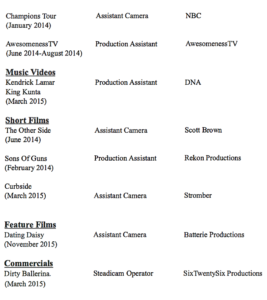How to PA: Starting a career in Los Angeles
I recently mentioned to a good friend that back when I was an Assistant Director, I wrote a couple long emails to some people who were just getting started in the industry. Since it was apparently decent advice, I thought I’d put it her fore all to see. In this post, I’ll just give you my two cents on what it means to work as a Production Assistant in Los Angeles. I’ll also create a few more posts about:
- The best ways to get steady work
- The duties of a PA within the AD department, and the tricks to be better than average
- Wether or not film school is worth attending (in my humble opinion)
Without any more delay, here’s….
What to consider when starting a production assistant career in Los Angeles
Let’s start with the financial side. How much money do you need to live and work in LA? Well, let’s add the essentials up:
- Rent & utilities: I’d say $800 on average for a room in a shared apartment. You can get cheaper, but your gas bill will get steeper as you live further away from the epicenters of LA’s film production, which are:
- New media: Santa Monica, West LA, Culver City, Playa Vista
- Traditional film/TV: Burbank & Studio City
- Other hot spots for random things: Downtown LA & Santa Clarita
- Food: On days you’ll be working, you’ll only have to cover your breakfast & dinner, so $10 to $15 depending on your habits. For the rest of the days, $15 to $30.
- Transportation: Assuming you don’t have car payments to make, consider your insurance cost plus $100 to $200 in gas, depending on your vehicle. Freelancing often takes you very far from home, and production companies will only pay your mileage if you are filming outside of the TMZ (and maybe not even that if it’s a low-paid gig).
Bare minimum total: $800 + $500 + $200 = $1,500.
And as I’m typing this, it still seems low to me. To be safe, I would advise you to go with $2,000. If you end up living for cheaper, great.
The minimum wage in California is currently $10.50/h. If the job you are on is low-paid/free, your daily check will be anywhere between 0 and $150.
If you work for a larger production company, you will usually get a 12h guarantee, which means that (factoring overtime rates), you will earn $147 per day. That is to say, $147 gross. Your net will be around $115 if you are a single young adult (tax breakdown with 1 tax allowance: Federal $16.59, Fica $9.11, Medicare $2.13, State $4.17, SDI $1.32).
So in order to survive, you need to work a minimum of 14 days per month in the best case scenario.
How long will it take acquire steady work?
This is a tricky question to answer accurately, as it depends on your connections, experience and luck. It could be anywhere from a month to a year. If you have:
- good connections, experience and luck: 1 month
- experience and luck: 6 months
- experience: 9 months
- finally, if you don’t have any of the above, don’t expect miracles to happen. It’s going to take a lot of time.
So applying the previous section’s math, here’s the amount of savings you’ll need:
- good connections, experience and luck: $2,000
- experience and luck: $10-12K (you’ll make some money here and there along the way)
- experience: $15-18k
- none of the above: $20-24k
If you’re thinking of getting a side job to sustain yourself while starting your career, consider the following:
- The unemployment rate is LA is 7.5%
- taking a side job will hinder your ability to work. A lot of jobs are very last minute (you’ll get a call at 8pm for the following morning) and getting out of your day job isn’t alway easy. Uber/Lyft are great ways to make money whenever you want to, but driving a taxi isn’t for everyone…
How to prepare your move to LA
I can’t tell you how many times I’ve received someone’s “friend’s” or “nephew’s” resume that consisted of:
- some college education
- 1 short film
- 1 irrelevant work experience
Unless the person referring you is my direct boss, there is almost 0 chances that you will receive a call. Why? Because there are people with more experience who are still interns. Here’s the actual resume of an intern I’ve worked with:
 So before you move to Los Angeles, my biggest advice is: get experience where you are. It doesn’t matter what it is, as long as it was made with a camera. It can even be content that you made using your phone. When I receive a resume, I always compare it to my own when I started looking for jobs in LA. Back then, I had:
So before you move to Los Angeles, my biggest advice is: get experience where you are. It doesn’t matter what it is, as long as it was made with a camera. It can even be content that you made using your phone. When I receive a resume, I always compare it to my own when I started looking for jobs in LA. Back then, I had:
- worked on over 20 short films while in school
- worked as an intern for 3 different production companies, 6 months each
- done a few odd projects for free, like music videos or photo shoots
- worked as a full time AD intern for a french cable TV show
And even with that, I wasn’t getting a lot of hits. It’s very possible that me being french deterred some producers, but overall, I think that there were just a lot of people with similar or better experience, and with some flashy show names (if you have a network show on your resume, it definitely boosts your odds).
If you resume barely has any film related experience on it, I’m not going to call you. Even if I’m not paying you. Training you will be more work for me than running all day long doing 2 people’s jobs.
In conclusion
Getting started in Los Angeles takes more than landing there and working for free. Before competing for paid work, you will have to compete for non-paid work. Just like you wouldn’t start boxing at a pro level right off the bat, don’t come to Los Angeles with zero experience. Build your resume where it’s cheap for you to live, and then give it shot in the big leagues.


0 Comments